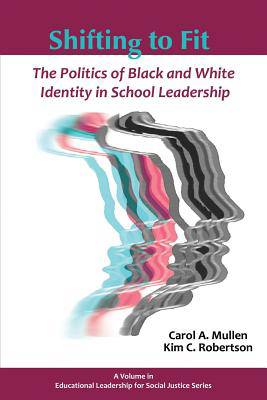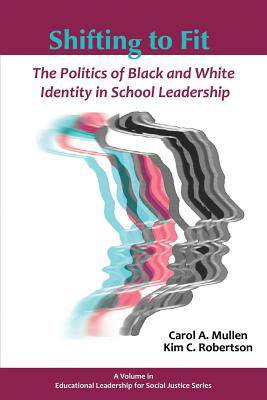
- Afhalen na 1 uur in een winkel met voorraad
- Gratis thuislevering in België vanaf € 30
- Ruim aanbod met 7 miljoen producten
- Afhalen na 1 uur in een winkel met voorraad
- Gratis thuislevering in België vanaf € 30
- Ruim aanbod met 7 miljoen producten
Zoeken
Shifting to Fit
The Politics of Black and White Identity in School Leadership
Carol A Mullen, Kim Robertson
€ 84,95
+ 169 punten
Uitvoering
Omschrijving
A volume in Educational Leadership for Social Justice Series Editor Jeffrey S. Brooks, University of Idaho, Denise E. Armstrong, Brock University; Ira Bogotch, Florida Atlantic University; Sandra Harris, Lamar University; Whitney H. Sherman, Virginia Commonwealth University; George Theoharis, Syracuse University While social identity challenges probably confront all school administrators, the authors focus on a doubly marginalized leadership population-Black female principals-whose experiences are rarely tapped. Based on lessons from this study and the literature reviewed, the authors think that leadership preparation programs should give prospective administrators opportunities to gain knowledge and develop skills relevant to navigating their leadership identities. In the age of accountability, and with the pressures placed on the education system to ensure the success of all students, school leaders are under constant scrutiny. The appearance, speech, body language, and interactions of principals with students, parents, teachers, and community members are dissected. Stretching to satisfy expectations, many principals find themselves trying to conform to a predefined image. Work pressures like these prove immeasurably intense for many Black women. Society has subscribed to certain beliefs about different groups, and these beliefs affect the roles, responsibilities, and identities of the individuals. They can have a positive or negative influence. Many principals have created professional identities that they have fine-tuned and learned to steer. Trial and error has helped them learn identity-fitting techniques, while other principals may still be learning how to effectively manage people, address supporters and nonsupporters, and be politically savvy. Regardless of how they develop their identity, principals work toward inventing and branding themselves, fulfilling public identities (e.g., caregiver) and trying out new identities, such as commander-and-chief. Black female principals must navigate their identities as bicultural beings with different stakeholder groups and within work spaces that are traditionally geared to monocultural White males.
Specificaties
Betrokkenen
- Auteur(s):
- Uitgeverij:
Inhoud
- Aantal bladzijden:
- 186
- Taal:
- Engels
- Reeks:
Eigenschappen
- Productcode (EAN):
- 9781623966614
- Verschijningsdatum:
- 21/03/2014
- Uitvoering:
- Paperback
- Formaat:
- Trade paperback (VS)
- Afmetingen:
- 156 mm x 234 mm
- Gewicht:
- 267 g

Alleen bij Standaard Boekhandel
+ 169 punten op je klantenkaart van Standaard Boekhandel
Beoordelingen
We publiceren alleen reviews die voldoen aan de voorwaarden voor reviews. Bekijk onze voorwaarden voor reviews.











